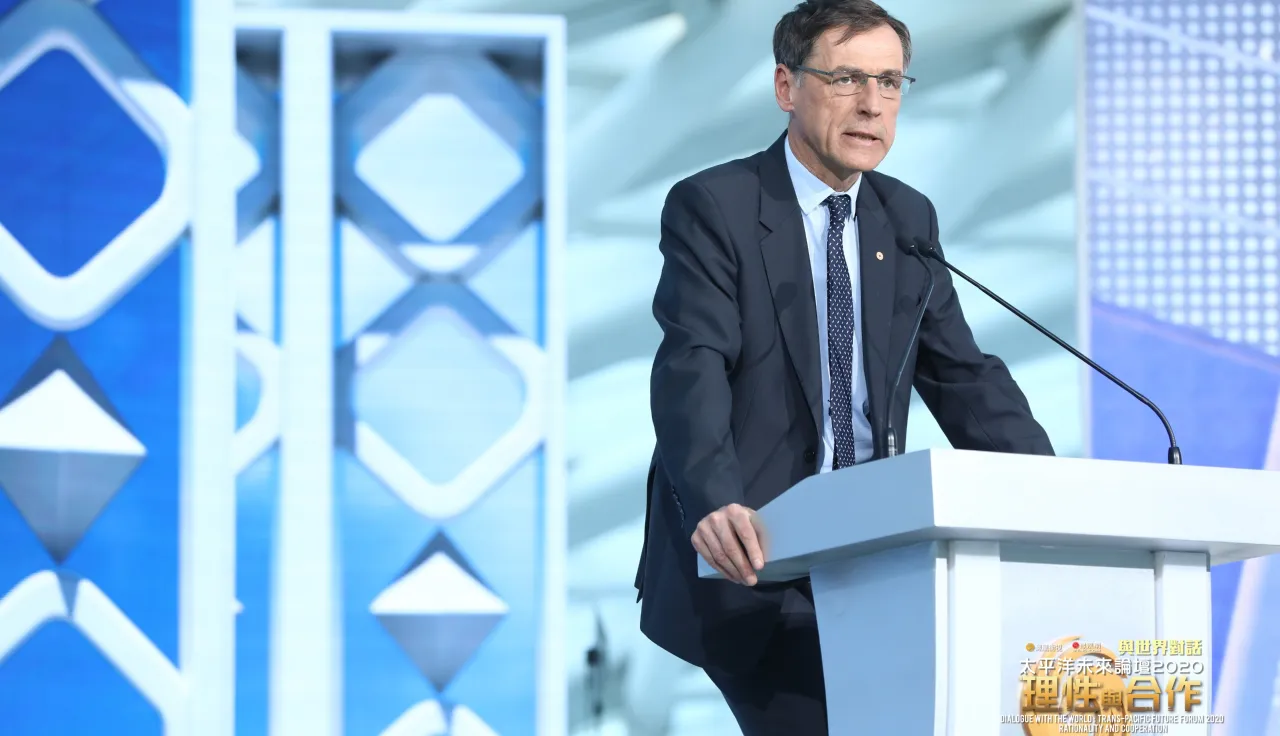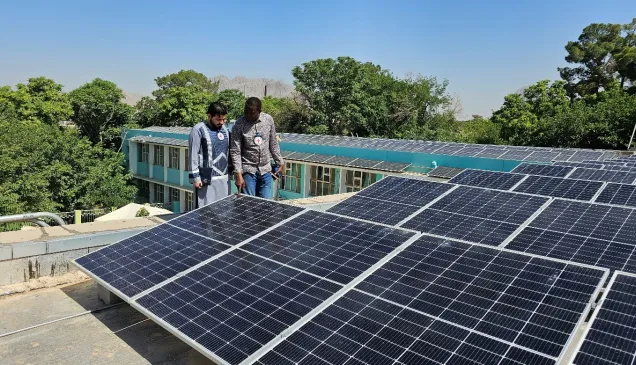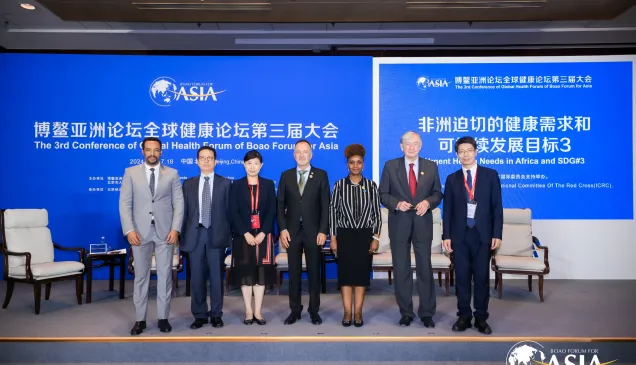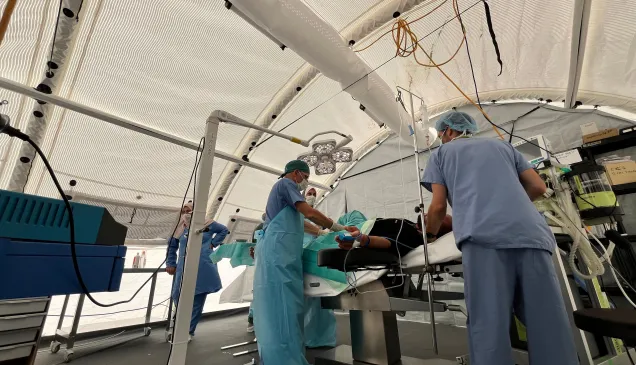COVID-19 Crisis and International Cooperation – A humanitarian perspective

Speech of Jacques Pellet, Personal Envoy of the ICRC President for China and Head of the ICRC Regional Delegation for East Asia, at the Public Health Panel of 2020 Trans-Pacific Future Forum on 2020 December 16.
Thank you very much for inviting the International Committee of the Red Cross (ICRC) to give its views on the COVID-19 crisis and cooperation. As you know, we're a very old international humanitarian organization. We're working in places of conflict, violence and fragility. We have 20,000 staff across the world, working in more than 100 countries. And 40% of what we're doing, in terms of assistance and protection, is in Africa, and our main operations include Afghanistan, Syria, South Sudan, Libya, Sahel, so on and so forth. You can see on the map here, we're working in those places faced with frontline conflicts. I would like to give our own perspectives from the field about this pandemic and the way to respond to the pandemic.
We speak about the world and we speak about stability. Here you can see some of the figures. According to the World Bank, there are 2 billion people living in situations of fragility. According to UNOCHA, there are more than 235 million people in need of humanitarian assistance, and the number of enforced displaced people and refugees has reached 70 million, which has never been higher since WWII.
This is the context we have to work in and we have to deal with.
I have three main messages.
The first is that most humanitarian crisis today are of a protracted nature and 80% of humanitarian needs are linked to war and armed conflicts. The COVID-19 pandemic, unfortunately, does not stop the war despite the call for ceasefire which has been made by the UN Secretary General. On the contrary, we see some conflicts resuming. There are 100 armed conflicts across the world involving 60 states and more than 100 non-state armed groups.
So what does it mean? First it means lack of infrastructures in the field. The health infrastructure in those countries are very weak, if they are not destroyed or attacked intentionally. That's why we're also calling for respect for International Humanitarian Law (IHL) to stop attacks against health personnel and health facilities.
It means also for us a very complex and difficult access to the people and communities in needs. I want to stress that 60 million of people are living under the control of non-state armed groups; that means 60 million people that the governments or states have no access to.
Covid-19 pandemic for most people in those places is just an additional layer of vulnerability; and it's a burden over other challenges those people and communities have to face, such as other diseases like malaria and polio, and also lack of water, the climate change issues and migration and so on and so forth. One of the concerns we have, as an international humanitarian organization, is that we hope that those contexts should not be overlooked by the global response to the pandemic. It's not necessarily a big number of population, but they are the most vulnerable, and most remote and the most difficult to access, and this has to be taken into account.
My second message is that large scale public health emergencies are seldom only health crisis. Pandemics cannot be addressed solely as health issues. They are often compounded by other factors such as the lack of water and sanitation, poor infrastructure, socio-economic risks and enforced displacement of population. This is also the case for the COVID-19 pandemic. The response must be comprehensive, and it must go far beyond health needs.
The response must be available to all those people in need without discrimination; that is also a big challenge. The response must be accepted by the people and the communities. We need the trust of the communities and we need to engage with them. We have seen with the response to Ebola where communities are not convinced and they think there might be some negative impact on the way you fight the pandemic.
What we are witnessing in fact in many places of Africa, is that the pandemic itself does not necessarily have high impact in terms of health. But It has what we call the secondary impact, which is the socio-economic impact, which has to be included in the response to the pandemic.
If we focus only on the health dimension, we will miss the objective; and we should not forget that health crisis is multidimensional. Don't forget the traditional immunization campaigns. According to our figures, 80 million children under the age of one may not be vaccinated against measles, diphtheria and polio, which only makes them more vulnerable to COVID-19 pandemic.
My last message is that cooperation is not a nice to have but a must to have. No country, no international organization can do it alone.
ICRC is a multidisciplinary organization, and our response has been coordinated with the WHO and UN agencies, ministries of health, and Red Cross Red Crescent societies in many countries. Multi-stakeholder collaboration is very important, including the corporate sector.
China has an important role to play, not only as a provider of procurement, aid and assistance on a bilateral basis, as it was the case in the beginning of the year, when China provided assistance and aid to many countries in terms of PPE and medical equipment, but it has also to be a strong supporter of the work done by international organizations and other stakeholders.
The remarks by President Xi Jinping that China vaccine will be a Global Public Good and the decision of China to be part of the COVAX system, are the most welcome. We need to see how it will be concretely implemented.
Finally, China's support to international humanitarian organizations is also very needed. The voice of China to make all parties to conflict strictly comply with the International Humanitarian Law is also more needed than ever due to China's growing influence in today's world.
Recently Permanent Mission of China to the UN in New York clearly stated and called on the international community to support to the complementary role of WHO and ICRC in the fight against the pandemic in conflict settings. And for us, those kinds of call are very important and useful.
Thank you very much.



